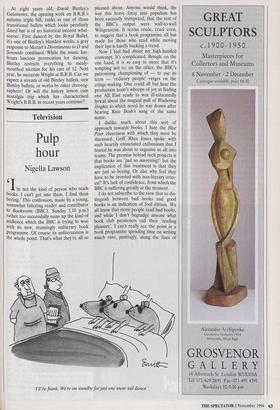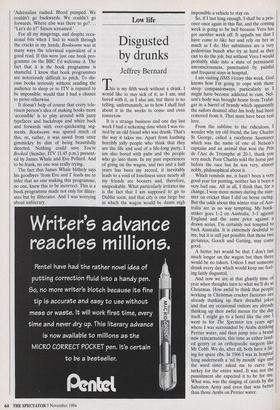Television
Pulp hour
Nigella Lawson
I'm not the kind of person who reads books. I can't get into them. I find them boring.' This confession, made by a young, somewhat faltering reader and contributor to Bookworm (BBC1, Sunday 5.10 p.m.) rather too successfully sums up the kind of audience which the BBC is trying to woo with its new, stunningly unliterary book programme. Of course its unliterariness is the whole point. That's what they're all so pleased about. Anyone would think, the way this brave foray into populism has been earnestly trumpeted, that the rest of the BBC's output were wall-to-wall Wittgenstein. It seems crude, cruel even, to suggest that a book programme all but made for those who read while moving their lips is hardly bucking a trend.
Now I feel bad about my high-handed contempt. It's complicated, though: on the one hand, it is so easy to sneer that it's tempting not to; on the other, the BBC's patronising championing of — to use its term — 'ordinary people' verges on the cringe-making. One could all but hear the production team's whoops of joy at finding one Alf East ready to wax ill-educatedly lyrical about the magical pull of Wuthering Heights to which novel he was drawn after hearing Kate Bush's song of the same name.
I dislike much about this sort of approach towards books. I hate the Blue Peter cheeriness with which they must be discussed: Griff Rhys Jones spoke with such heartily enunciated enthusiasm that I feared he was about to organise us all into teams. The premise behind such projects is that books are 'just so interesting!' but the implication of this treatment is that they are just so boring. Or else why feel they have to be invested with non-literary inter- est? It's lack of confidence, from which the BBC is suffering greatly at the moment.
I do not subscribe to the view that to dis- tinguish between bad books and good books is an indication of foul elitism. We all know that more people read bad books, and while I don't begrudge anyone what book club promoters call their 'reading pleasure', I can't really see the point in a book programme spending time on writing which runs, pantingly, along the lines of be frank. We're on standby for just one more tail donor.' `Adrenaline rushed. Blood pumped. We couldn't go backwards. We couldn't go forwards. Where else was there to go? "Let's do it!" Simon screamed.'
For all my misgivings, and despite occa- sional bits when I had to watch through the cracks in my hands, Bookworm was in many ways the televisual equivalent of a good read. If this were just one book pro- gramme on the BBC I'd welcome it. The fact that it is the book programme is shameful. I know that book programmes are notoriously difficult to pitch. To dis- cuss books seriously without sending the audience to sleep or to ITV is reputed to be impossible; would that I had a chance to prove otherwise.
It doesn't help of course that every tele- vision person's idea of making books more `accessible' is to play around with jazzy typefaces and backdrops and whizz back and forwards with ever-quickening seg- ments. Bookworm was spared much of this, or, rather, it was saved from utter gimmickry by dint of being beautifully directed. Nothing could save You're Booked (Sunday, ITV 11.45 p.m.) present- ed by James Whale and Eve Pollard. And to be frank, no one was really trying.
The fact that James Whale blithely says his goodbyes 'from Eve and I' leads me to infer that no one making this programme, no one, knew this to be incorrect. This is a book programme made not only for illiter- ates but by illiterates. And I was worrying about unliterary.











































































 Previous page
Previous page